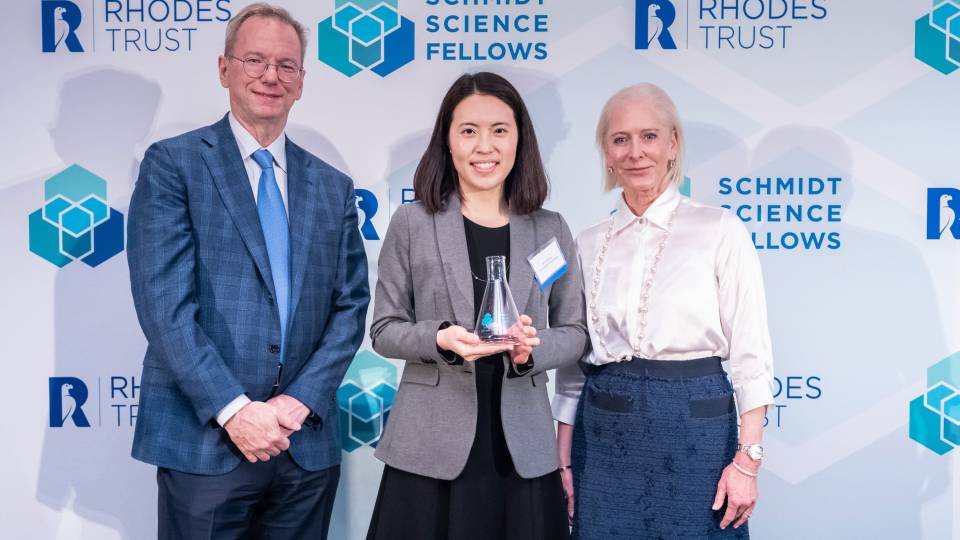Eric and Wendy Schmidt announced on April 8 that three recent Princeton graduate alumni are among 22 new Schmidt Science Fellows — a program of Schmidt Futures, in partnership with the Rhodes Trust. The year-long fellowship aims to develop the next generation of science leaders through interdisciplinary research to solve the world’s most pressing problems.
The Schmidt Science Fellows from Princeton are Ben Winer, William ("Chuck") Witt and Evan Zhao. They completed their doctoral degrees in 2019. With three fellows this year, Princeton is the institution with the highest number of recipients in one year since the founding of the program three years ago.
Schmidt Science Fellows are supported to pursue a postdoctoral research placement at a world-leading laboratory anywhere in the world. This placement must be in research at a significantly different discipline from the fellow’s Ph.D., with the aim of exposing them to ideas and skills that will help them examine scientific problems and approaches from different perspectives and to accelerate discoveries. Each fellow receives a $100,000 stipend and is paired with an internationally accomplished and experienced senior scientist as a mentor.
“As the need for rapid and innovative scientific discovery and response grows more urgent during this global pandemic, we are convinced now, more than ever, there is tremendous value in recruiting the most promising scientific minds to apply their intellectual rigor and investigation to additional disciplines,” said Wendy Schmidt, co-founder of Schmidt Futures. “These exceptional early-career scientists join a growing community of Schmidt Science Fellows working to make transformative contributions, including new ways to fight against pandemic pathogens. Eric and I are excited to see what they can accomplish together.”
“The current crisis has shown us the importance of scientists working across disciplines and engaging with society and policymakers,” said Eric Schmidt, co-founder of Schmidt Futures and a 1976 graduate of Princeton’s engineering school. “This new group of Schmidt Science Fellows demonstrates our commitment at Schmidt Futures to investing in talented people who can make the world a better place, in the long run and even during some of the most challenging times in recent memory.”

Ben Winer
Ben Winer
Winer’s Ph.D. research in molecular biology involved developing advanced human liver tissue culture models and humanized mouse models to study how the Hepatitis B virus establishes chronic infections. He was the first student to complete a Ph.D. in the lab of Associate Professor of Molecular Biology Alexander Ploss.
As a Schmidt Science Fellow, Winer plans to take a systems biology approach to explore how migratory immune cells navigate the body. By understanding at a molecular level how individual cells interpret external chemical cues for proper guidance, he hopes to advance knowledge in immunology, infectious disease and cancer biology.

William Witt
William Witt
During his Ph.D. in mechanical and aerospace engineering under the guidance of former engineering dean Emily Carter, Witt worked on improving computer simulations of the behavior of atoms within materials. He helped to overcome challenges in computer processing of models involving many atoms through advancing orbital-free density theory.
As a Schmidt Science Fellow, Witt will use machine learning techniques to simulate very large-scale polymer systems and to develop new plastics. He hopes that this work could lead to plastic products that maintain useful qualities while reducing harmful effects, such as microplastic pollution.

Evan Zhao
Evan Zhao
Zhao completed his engineering Ph.D. working with José Avalos, assistant professor of chemical and biological engineering and the Andlinger Center for Energy and the Environment. In his research, he used timed light to control and then engineer microbes to produce new, valuable chemicals without the need for fossil fuel-based precursors.
As a Schmidt Science Fellow, he is now pivoting to work on RNA sensing in cells for medical applications. Zhao aims to use a cell’s ability to sense its environment to develop a sensor that could control the production of therapeutic proteins within the cell, tailoring treatment to a patient’s specific needs.







